2022中考英语一轮复习PPT课件 第15课时 Units 3—4,Book 9
文档属性
| 名称 | 2022中考英语一轮复习PPT课件 第15课时 Units 3—4,Book 9 | 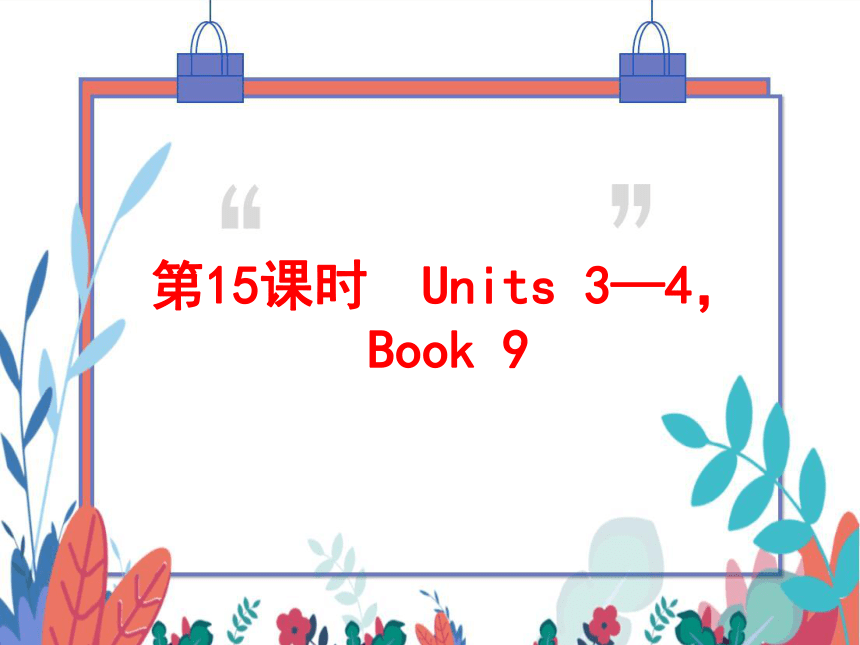 | |
| 格式 | ppt | ||
| 文件大小 | 646.5KB | ||
| 资源类型 | 试卷 | ||
| 版本资源 | 通用版 | ||
| 科目 | 英语 | ||
| 更新时间 | 2022-06-01 15:06:18 | ||
图片预览

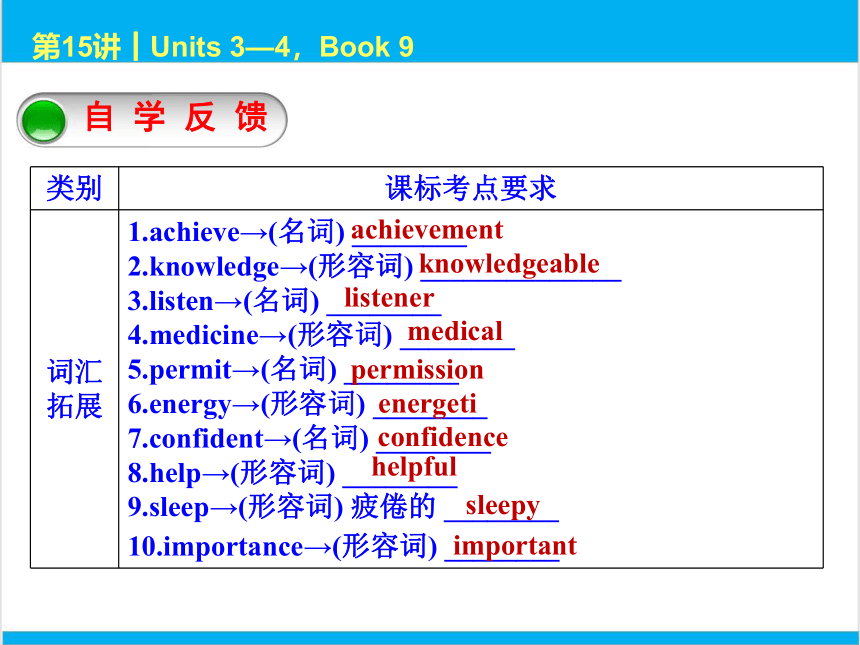
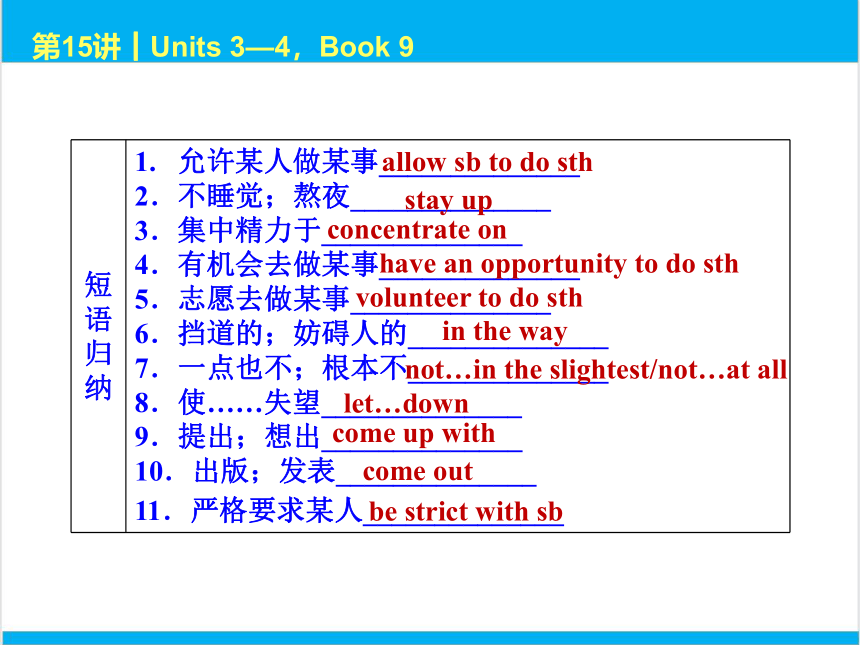
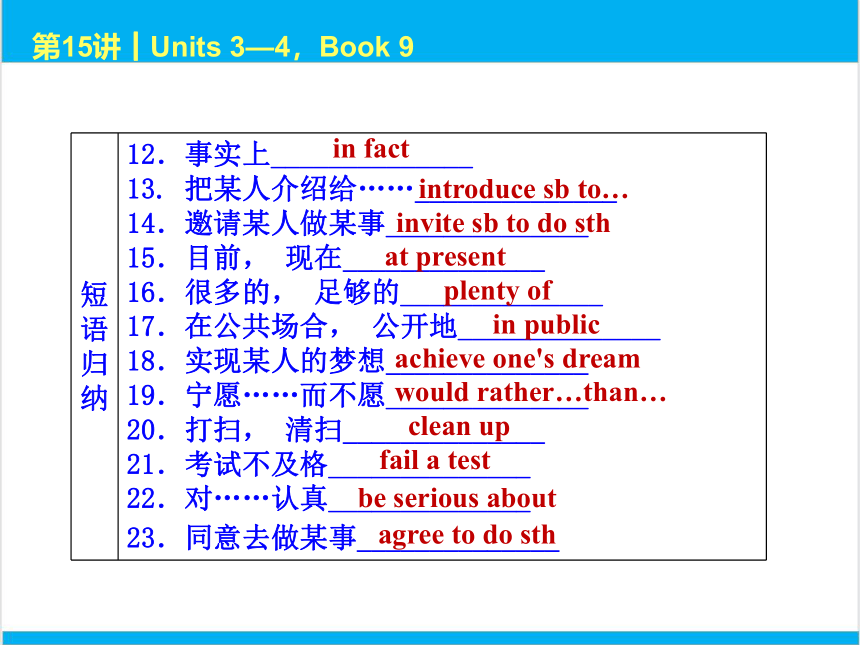
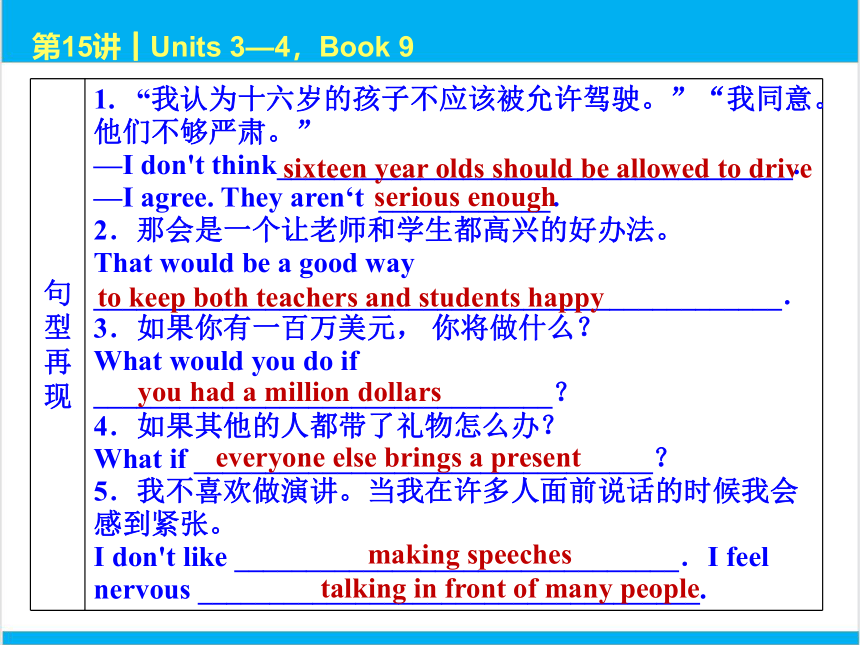
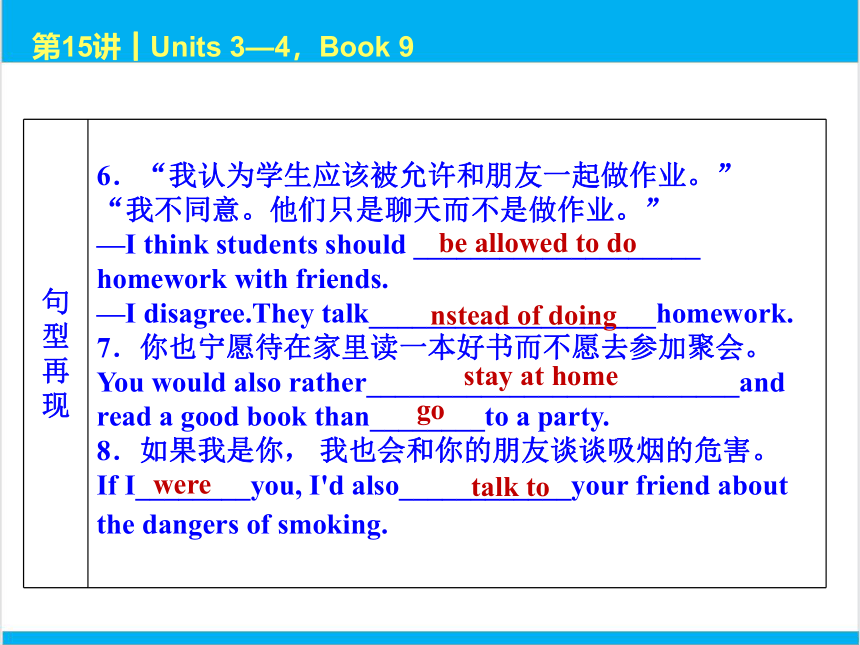
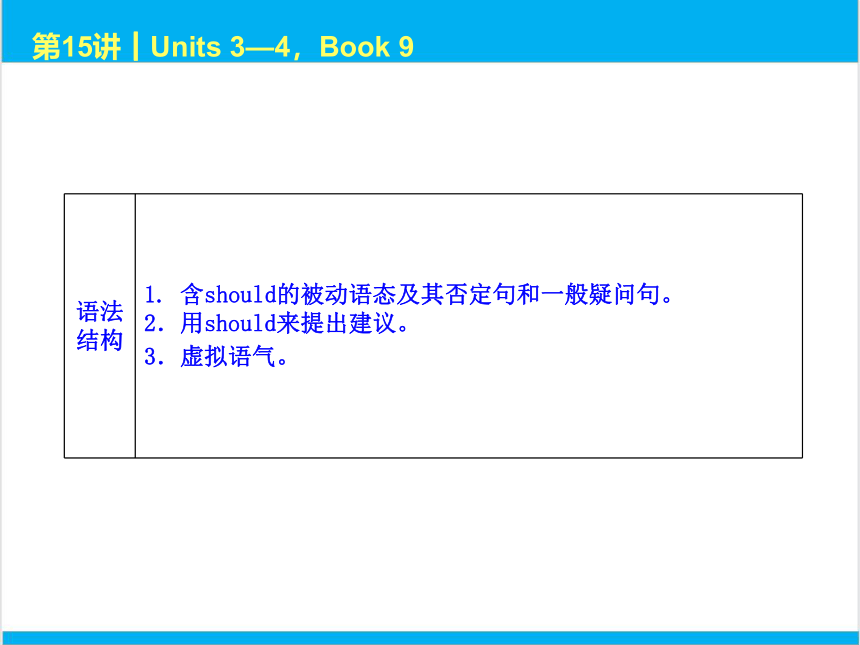
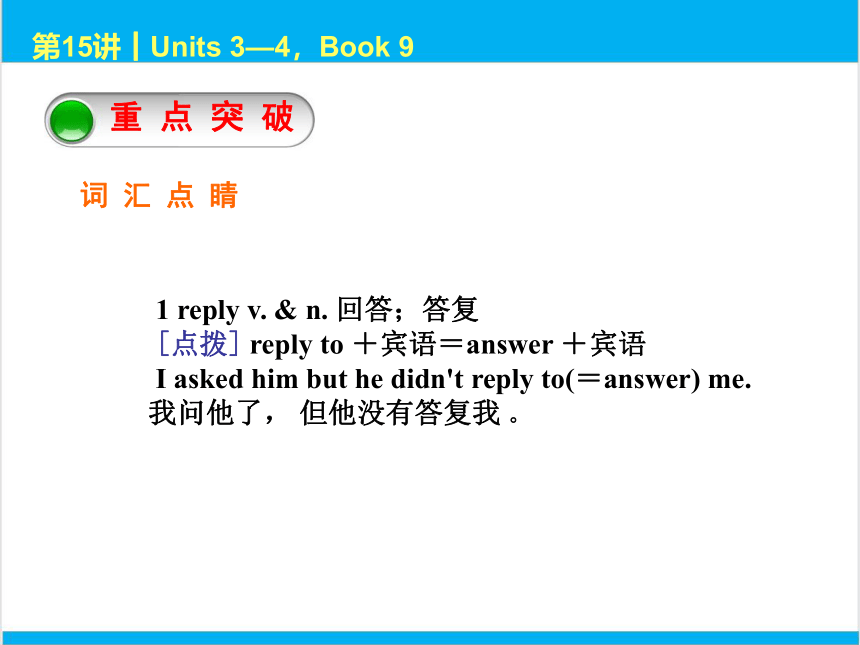
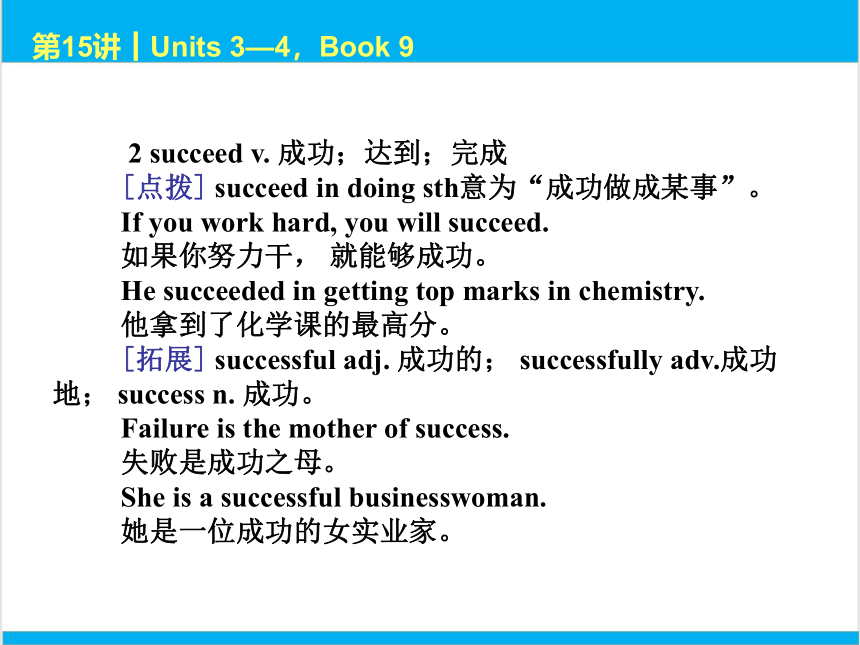
文档简介
(共27张PPT)
第15课时 Units 3—4,Book 9
第15讲┃Units 3—4,Book 9
自 学 反 馈
类别 课标考点要求
词汇
拓展 1.achieve→(名词) ________
2.knowledge→(形容词) ______________
3.listen→(名词) ________
4.medicine→(形容词) ________
5.permit→(名词) ________
6.energy→(形容词) ________
7.confident→(名词) ________
8.help→(形容词) ________
9.sleep→(形容词) 疲倦的 ________
10.importance→(形容词) ________
achievement
knowledgeable
listener
medical
permission
energeti
confidence
helpful
sleepy
important
短语
归纳 1. 允许某人做某事______________
2.不睡觉;熬夜______________
3.集中精力于______________
4.有机会去做某事______________
5.志愿去做某事______________
6.挡道的;妨碍人的______________
7.一点也不;根本不______________
8.使……失望______________
9.提出;想出______________
10.出版;发表______________
11.严格要求某人______________
allow sb to do sth
stay up
concentrate on
have an opportunity to do sth
volunteer to do sth
in the way
not…in the slightest/not…at all
let…down
come up with
come out
be strict with sb
第15讲┃Units 3—4,Book 9
短语
归纳 12.事实上______________
13. 把某人介绍给……______________
14.邀请某人做某事______________
15.目前, 现在______________
16.很多的, 足够的______________
17.在公共场合, 公开地______________
18.实现某人的梦想______________
19.宁愿……而不愿______________
20.打扫, 清扫______________
21.考试不及格______________
22.对……认真______________
23.同意去做某事______________
in fact
introduce sb to…
invite sb to do sth
at present
plenty of
in public
achieve one's dream
would rather…than…
clean up
fail a test
be serious about
agree to do sth
第15讲┃Units 3—4,Book 9
句型
再现 1. “我认为十六岁的孩子不应该被允许驾驶。”“我同意。他们不够严肃。”
—I don't think____________________________________.
—I agree. They aren‘t ____________.
2.那会是一个让老师和学生都高兴的好办法。
That would be a good way ________________________________________________.
3.如果你有一百万美元, 你将做什么?
What would you do if ________________________________?
4.如果其他的人都带了礼物怎么办?
What if ________________________________?
5.我不喜欢做演讲。当我在许多人面前说话的时候我会感到紧张。
I don't like _______________________________.I feel nervous ___________________________________.
sixteen year olds should be allowed to drive
serious enough
to keep both teachers and students happy
you had a million dollars
everyone else brings a present
making speeches
talking in front of many people
第15讲┃Units 3—4,Book 9
句型
再现
6.“我认为学生应该被允许和朋友一起做作业。”
“我不同意。他们只是聊天而不是做作业。”
—I think students should ____________________ homework with friends.
—I disagree.They talk____________________homework.
7.你也宁愿待在家里读一本好书而不愿去参加聚会。
You would also rather__________________________and read a good book than________to a party.
8.如果我是你, 我也会和你的朋友谈谈吸烟的危害。
If I________you, I'd also____________your friend about the dangers of smoking.
be allowed to do
nstead of doing
stay at home
go
were
talk to
第15讲┃Units 3—4,Book 9
语法
结构 1. 含should的被动语态及其否定句和一般疑问句。
2.用should来提出建议。
3.虚拟语气。
第15讲┃Units 3—4,Book 9
词 汇 点 睛
1 reply v. & n. 回答;答复
[点拨] reply to +宾语=answer +宾语
I asked him but he didn't reply to(=answer) me.
我问他了, 但他没有答复我 。
重 点 突 破
第15讲┃Units 3—4,Book 9
2 succeed v. 成功;达到;完成
[点拨] succeed in doing sth意为“成功做成某事”。
If you work hard, you will succeed.
如果你努力干, 就能够成功。
He succeeded in getting top marks in chemistry.
他拿到了化学课的最高分。
[拓展] successful adj. 成功的; successfully adv.成功地; success n. 成功。
Failure is the mother of success.
失败是成功之母。
She is a successful businesswoman.
她是一位成功的女实业家。
第15讲┃Units 3—4,Book 9
3 get along with 与……相处
[点拨] 表示“与……相处(融洽)”可以写成get on/along (well) with。另外, get on/along with 还可表示“取得进展, 继续做”。
The child doesn't get along well with others.
这个小孩不合群。
How have you been getting along with your work
你工作进展如何?
第15讲┃Units 3—4,Book 9
中考典例
我们应该学会与别人友好相处。
We should learn to _____ ________ well with others. [2019·永州]
get along/on
第15讲┃Units 3—4,Book 9
4 rest n. 剩余部分;其余;休息 v.休息
[点拨] (1)作名词, 常与定冠词the连用。当“the rest”或“the rest of the +名词”作主语时, 谓语动词的数要与the rest表示的名词的数保持一致。
The rest of the water is Kate's.
剩下的水是凯特的。
This e-mail is for me, and the rest of the e mails are for you.
这封电子邮件是给我的, 其他的电子邮件是给你的。
(2)作动词, 相当于have a rest。
You're too tired. You need to rest for a while.
你太累了, 需要休息一会儿。
第15讲┃Units 3—4,Book 9
5 come out 出版;发表
[点拨] come out 还可表示“出来;开花;显示”。
Come out and get some fresh air.
出来呼吸点新鲜空气。
The China roses will come out soon.
月季花很快就要开花了。
When will the dictionary come out
那本字典什么时候出版?
The photographs didn't come out very well.
相片冲洗得不是很好。
[拓展] come over 顺便来访 come in 进来
come along 出现;进展 come up with 提出;想出
come and go 来来去去 come from 来自
come true 实现;达到
第15讲┃Units 3—4,Book 9
中考典例
Cao Wenxuan’s new book has just _____ . Let’s go and buy one. [2020·盐城]
come over
come down
come on
come out
D
解析
根据主语“new book”以及“Let’s go and buy one. ”
可知是指书刚刚出版了,故选D
第15讲┃Units 3—4,Book 9
巧 辩 异 同
offer/provide
(1)offer 意为“提供”, 侧重表示“愿意给予”。常用搭
配:offer sb sth=offer sth to sb提供某人某物
offer to do sth 主动提出做某事
The flight attendant offers me hot water and food.
=The flight attendant offers hot water and food to me.
空乘人员给我提供热水和食物。
She offers to show us around.
她主动给我们当导游。
第15讲┃Units 3—4,Book 9
(2)provide 指为应付意外、紧急情况等做好充分准备而“供给, 提供”。provide sb with sth=provide sth for sb 意为“为某人提供某物”。
The school provides food for the students.
=The school provides the students with food.
学校为学生们提供伙食。
第15讲┃Units 3—4,Book 9
中考典例
The little boy _____ his seat to an old lady on the crowded bus. [2019·莱芜]
lent
offered
took
brought
B
解析
offer sb sth=offer sth to sb 意为“提供某人某物”
第15讲┃Units 3—4,Book 9
1 Sixteen year olds should be allowed to get their
ears pierced.
16岁的孩子们应该被允许穿耳孔。
[句型] (1)should be allowed是含有情态动词的被
动语态结构, 意为“应该被允许”, 其结构为“情态动
词+be+动词的过去分词”。
The work should be finished in two days.
这项工作应该在两天内完成。
句 型 透 视
第15讲┃Units 3—4,Book 9
(2)get their ears pierced意为“穿耳孔”, 为
“have/get sth done”结构, 意为“使/让某事(物)
被……”,尤其要注意:get sb to do sth =have sb do
sth,意为“让某人做某事”。
I will have my hair cut tomorrow.
明天我要请人(给我)理发。
My mother got me to take out the trash.
我妈妈让我倒垃圾。
第15讲┃Units 3—4,Book 9
2 —We have a lot of rules at my house.在我家里
我们有许多规章制度。
—So do we.我们也是。
[句型] “So do we.”是倒装句, 其结构“so+be动
词/助动词/情态动词+主语” 意为“……也一样”,表示
后句所述情况与前句所述的肯定情况相同。 两个句子
的主语不相同, 时态和前句保持一致。
Mary likes Chinese. So does Tom.
=Mary likes Chinese. Tom likes Chinese, too.
=Both Mary and Tom like Chinese.
=Mary and Tom both like Chinese.
玛丽喜欢汉语, 汤姆也喜欢汉语。
They went to the zoo yesterday. So did we.
他们昨天去了动物园, 我们也去了。
第15讲┃Units 3—4,Book 9
注意:“neither/nor+be动词/助动词/情态动词+
主语”意为“……也不……”,表示后句所述情况与前
句所述否定情况相同。
You didn't go to the park yesterday. Neither/Nor
did I.
昨天你没去公园, 我也没去。
[拓展] “so+主语+be动词/助动词/情态动词” 意
为“……确实是这样”, 表示所述情况确实如此, 起
强调作用, 两个句子的主语相同。
—He will speak at the meeting tomorrow.
他明天将在会上发言。
—So he will. 确实如此。
第15讲┃Units 3—4,Book 9
中考典例
His father likes keeping dogs and ______. [2020·遂宁]
A so is his mother
B so his mother does
C so does his mother
C
前句所述的肯定情况也适用于后句,所以用“so+be动词/助动词/情态动词”结构。
解析
第15讲┃Units 3—4,Book 9
3 Only then will I have a chance of achieving my
dream. 只有到那时, 我才有机会实现我的梦想。
[点拨] only引导的短语作状语并且放在句首时,
句子应使用部分倒装语序, 也就是将第一个助动词置
于主语之前。
Only in this way can you learn English well.
只有这样, 你才能学好英语。
Only after being asked three times did he come to
the meeting. 叫了三次, 他才来参加会议。
注意:如果句子为主从复合句, 则主句倒装,
从句不倒装。
Only when he is seriously ill does he ever stay in
bed.
病得很重时, 他才卧床休息。
第15讲┃Units 3—4,Book 9
4 If I were you, I'd take a small present.
如果我是你, 我就会带上一件小礼物。
[点拨] 此句中if引导的是一个虚拟条件句。此句
的虚拟语气表示与现实相反的假设, 表示不大可能实
现的愿望、想法、目的、猜测或纯粹的空想。表示与
现在事实相反的虚拟条件句, 主句的谓语动词用
“would/should/could/might +动词原形”, 条件状语
从句的动词用过去式, be用were。
If I were you, I would not say anything.
如果我是你, 我什么都不会说。
If I were not so busy, I would go with you.
假如我不太忙, 我会和你一起去。
第15讲┃Units 3—4,Book 9
5 What if I don't know anyone
如果我谁都不认识怎么办呢?
[点拨] What if…? 意为“如果……怎么样?”用
来说出自己的疑问, 以征求对方意见。相当于“Will
you…?”或“Shall we…?”另外what if还有“即
使……, 又有什么关系”的意思。
What if you go instead of me
要是你代替我去怎么样呢?
What if he doesn't want to help us
要是他不愿意帮助我们, 那该怎么办呢?
第15讲┃Units 3—4,Book 9
6 You would also rather stay at home and read a
good book than go to a party.
你也宁愿待在家里读一本好书, 而不愿去参加聚
会。
[句型] (1)would rather do sth than do sth=would
do sth rather than do sth
(2)prefer to do sth rather than do sth=prefer
doing sth to doing sth
I'd rather buy a new watch than repair the old
one.
=I would buy a new watch rather than repair the
old one.
=I prefer to buy a new watch rather than repair t
he old one.
我宁愿买一块新手表也不愿修理这块旧的。
第15讲┃Units 3—4,Book 9
中考典例
—How about climbing the hill
—I would rather _____ along the river than _____ the hill, I’m a bit. [2021·淮安]
A walk; climb B walking; climbing
C walking; to climb D walk; to climb
A
考查“would rather do sth than do sth”结构
解析
第15讲┃Units 3—4,Book 9
第15课时 Units 3—4,Book 9
第15讲┃Units 3—4,Book 9
自 学 反 馈
类别 课标考点要求
词汇
拓展 1.achieve→(名词) ________
2.knowledge→(形容词) ______________
3.listen→(名词) ________
4.medicine→(形容词) ________
5.permit→(名词) ________
6.energy→(形容词) ________
7.confident→(名词) ________
8.help→(形容词) ________
9.sleep→(形容词) 疲倦的 ________
10.importance→(形容词) ________
achievement
knowledgeable
listener
medical
permission
energeti
confidence
helpful
sleepy
important
短语
归纳 1. 允许某人做某事______________
2.不睡觉;熬夜______________
3.集中精力于______________
4.有机会去做某事______________
5.志愿去做某事______________
6.挡道的;妨碍人的______________
7.一点也不;根本不______________
8.使……失望______________
9.提出;想出______________
10.出版;发表______________
11.严格要求某人______________
allow sb to do sth
stay up
concentrate on
have an opportunity to do sth
volunteer to do sth
in the way
not…in the slightest/not…at all
let…down
come up with
come out
be strict with sb
第15讲┃Units 3—4,Book 9
短语
归纳 12.事实上______________
13. 把某人介绍给……______________
14.邀请某人做某事______________
15.目前, 现在______________
16.很多的, 足够的______________
17.在公共场合, 公开地______________
18.实现某人的梦想______________
19.宁愿……而不愿______________
20.打扫, 清扫______________
21.考试不及格______________
22.对……认真______________
23.同意去做某事______________
in fact
introduce sb to…
invite sb to do sth
at present
plenty of
in public
achieve one's dream
would rather…than…
clean up
fail a test
be serious about
agree to do sth
第15讲┃Units 3—4,Book 9
句型
再现 1. “我认为十六岁的孩子不应该被允许驾驶。”“我同意。他们不够严肃。”
—I don't think____________________________________.
—I agree. They aren‘t ____________.
2.那会是一个让老师和学生都高兴的好办法。
That would be a good way ________________________________________________.
3.如果你有一百万美元, 你将做什么?
What would you do if ________________________________?
4.如果其他的人都带了礼物怎么办?
What if ________________________________?
5.我不喜欢做演讲。当我在许多人面前说话的时候我会感到紧张。
I don't like _______________________________.I feel nervous ___________________________________.
sixteen year olds should be allowed to drive
serious enough
to keep both teachers and students happy
you had a million dollars
everyone else brings a present
making speeches
talking in front of many people
第15讲┃Units 3—4,Book 9
句型
再现
6.“我认为学生应该被允许和朋友一起做作业。”
“我不同意。他们只是聊天而不是做作业。”
—I think students should ____________________ homework with friends.
—I disagree.They talk____________________homework.
7.你也宁愿待在家里读一本好书而不愿去参加聚会。
You would also rather__________________________and read a good book than________to a party.
8.如果我是你, 我也会和你的朋友谈谈吸烟的危害。
If I________you, I'd also____________your friend about the dangers of smoking.
be allowed to do
nstead of doing
stay at home
go
were
talk to
第15讲┃Units 3—4,Book 9
语法
结构 1. 含should的被动语态及其否定句和一般疑问句。
2.用should来提出建议。
3.虚拟语气。
第15讲┃Units 3—4,Book 9
词 汇 点 睛
1 reply v. & n. 回答;答复
[点拨] reply to +宾语=answer +宾语
I asked him but he didn't reply to(=answer) me.
我问他了, 但他没有答复我 。
重 点 突 破
第15讲┃Units 3—4,Book 9
2 succeed v. 成功;达到;完成
[点拨] succeed in doing sth意为“成功做成某事”。
If you work hard, you will succeed.
如果你努力干, 就能够成功。
He succeeded in getting top marks in chemistry.
他拿到了化学课的最高分。
[拓展] successful adj. 成功的; successfully adv.成功地; success n. 成功。
Failure is the mother of success.
失败是成功之母。
She is a successful businesswoman.
她是一位成功的女实业家。
第15讲┃Units 3—4,Book 9
3 get along with 与……相处
[点拨] 表示“与……相处(融洽)”可以写成get on/along (well) with。另外, get on/along with 还可表示“取得进展, 继续做”。
The child doesn't get along well with others.
这个小孩不合群。
How have you been getting along with your work
你工作进展如何?
第15讲┃Units 3—4,Book 9
中考典例
我们应该学会与别人友好相处。
We should learn to _____ ________ well with others. [2019·永州]
get along/on
第15讲┃Units 3—4,Book 9
4 rest n. 剩余部分;其余;休息 v.休息
[点拨] (1)作名词, 常与定冠词the连用。当“the rest”或“the rest of the +名词”作主语时, 谓语动词的数要与the rest表示的名词的数保持一致。
The rest of the water is Kate's.
剩下的水是凯特的。
This e-mail is for me, and the rest of the e mails are for you.
这封电子邮件是给我的, 其他的电子邮件是给你的。
(2)作动词, 相当于have a rest。
You're too tired. You need to rest for a while.
你太累了, 需要休息一会儿。
第15讲┃Units 3—4,Book 9
5 come out 出版;发表
[点拨] come out 还可表示“出来;开花;显示”。
Come out and get some fresh air.
出来呼吸点新鲜空气。
The China roses will come out soon.
月季花很快就要开花了。
When will the dictionary come out
那本字典什么时候出版?
The photographs didn't come out very well.
相片冲洗得不是很好。
[拓展] come over 顺便来访 come in 进来
come along 出现;进展 come up with 提出;想出
come and go 来来去去 come from 来自
come true 实现;达到
第15讲┃Units 3—4,Book 9
中考典例
Cao Wenxuan’s new book has just _____ . Let’s go and buy one. [2020·盐城]
come over
come down
come on
come out
D
解析
根据主语“new book”以及“Let’s go and buy one. ”
可知是指书刚刚出版了,故选D
第15讲┃Units 3—4,Book 9
巧 辩 异 同
offer/provide
(1)offer 意为“提供”, 侧重表示“愿意给予”。常用搭
配:offer sb sth=offer sth to sb提供某人某物
offer to do sth 主动提出做某事
The flight attendant offers me hot water and food.
=The flight attendant offers hot water and food to me.
空乘人员给我提供热水和食物。
She offers to show us around.
她主动给我们当导游。
第15讲┃Units 3—4,Book 9
(2)provide 指为应付意外、紧急情况等做好充分准备而“供给, 提供”。provide sb with sth=provide sth for sb 意为“为某人提供某物”。
The school provides food for the students.
=The school provides the students with food.
学校为学生们提供伙食。
第15讲┃Units 3—4,Book 9
中考典例
The little boy _____ his seat to an old lady on the crowded bus. [2019·莱芜]
lent
offered
took
brought
B
解析
offer sb sth=offer sth to sb 意为“提供某人某物”
第15讲┃Units 3—4,Book 9
1 Sixteen year olds should be allowed to get their
ears pierced.
16岁的孩子们应该被允许穿耳孔。
[句型] (1)should be allowed是含有情态动词的被
动语态结构, 意为“应该被允许”, 其结构为“情态动
词+be+动词的过去分词”。
The work should be finished in two days.
这项工作应该在两天内完成。
句 型 透 视
第15讲┃Units 3—4,Book 9
(2)get their ears pierced意为“穿耳孔”, 为
“have/get sth done”结构, 意为“使/让某事(物)
被……”,尤其要注意:get sb to do sth =have sb do
sth,意为“让某人做某事”。
I will have my hair cut tomorrow.
明天我要请人(给我)理发。
My mother got me to take out the trash.
我妈妈让我倒垃圾。
第15讲┃Units 3—4,Book 9
2 —We have a lot of rules at my house.在我家里
我们有许多规章制度。
—So do we.我们也是。
[句型] “So do we.”是倒装句, 其结构“so+be动
词/助动词/情态动词+主语” 意为“……也一样”,表示
后句所述情况与前句所述的肯定情况相同。 两个句子
的主语不相同, 时态和前句保持一致。
Mary likes Chinese. So does Tom.
=Mary likes Chinese. Tom likes Chinese, too.
=Both Mary and Tom like Chinese.
=Mary and Tom both like Chinese.
玛丽喜欢汉语, 汤姆也喜欢汉语。
They went to the zoo yesterday. So did we.
他们昨天去了动物园, 我们也去了。
第15讲┃Units 3—4,Book 9
注意:“neither/nor+be动词/助动词/情态动词+
主语”意为“……也不……”,表示后句所述情况与前
句所述否定情况相同。
You didn't go to the park yesterday. Neither/Nor
did I.
昨天你没去公园, 我也没去。
[拓展] “so+主语+be动词/助动词/情态动词” 意
为“……确实是这样”, 表示所述情况确实如此, 起
强调作用, 两个句子的主语相同。
—He will speak at the meeting tomorrow.
他明天将在会上发言。
—So he will. 确实如此。
第15讲┃Units 3—4,Book 9
中考典例
His father likes keeping dogs and ______. [2020·遂宁]
A so is his mother
B so his mother does
C so does his mother
C
前句所述的肯定情况也适用于后句,所以用“so+be动词/助动词/情态动词”结构。
解析
第15讲┃Units 3—4,Book 9
3 Only then will I have a chance of achieving my
dream. 只有到那时, 我才有机会实现我的梦想。
[点拨] only引导的短语作状语并且放在句首时,
句子应使用部分倒装语序, 也就是将第一个助动词置
于主语之前。
Only in this way can you learn English well.
只有这样, 你才能学好英语。
Only after being asked three times did he come to
the meeting. 叫了三次, 他才来参加会议。
注意:如果句子为主从复合句, 则主句倒装,
从句不倒装。
Only when he is seriously ill does he ever stay in
bed.
病得很重时, 他才卧床休息。
第15讲┃Units 3—4,Book 9
4 If I were you, I'd take a small present.
如果我是你, 我就会带上一件小礼物。
[点拨] 此句中if引导的是一个虚拟条件句。此句
的虚拟语气表示与现实相反的假设, 表示不大可能实
现的愿望、想法、目的、猜测或纯粹的空想。表示与
现在事实相反的虚拟条件句, 主句的谓语动词用
“would/should/could/might +动词原形”, 条件状语
从句的动词用过去式, be用were。
If I were you, I would not say anything.
如果我是你, 我什么都不会说。
If I were not so busy, I would go with you.
假如我不太忙, 我会和你一起去。
第15讲┃Units 3—4,Book 9
5 What if I don't know anyone
如果我谁都不认识怎么办呢?
[点拨] What if…? 意为“如果……怎么样?”用
来说出自己的疑问, 以征求对方意见。相当于“Will
you…?”或“Shall we…?”另外what if还有“即
使……, 又有什么关系”的意思。
What if you go instead of me
要是你代替我去怎么样呢?
What if he doesn't want to help us
要是他不愿意帮助我们, 那该怎么办呢?
第15讲┃Units 3—4,Book 9
6 You would also rather stay at home and read a
good book than go to a party.
你也宁愿待在家里读一本好书, 而不愿去参加聚
会。
[句型] (1)would rather do sth than do sth=would
do sth rather than do sth
(2)prefer to do sth rather than do sth=prefer
doing sth to doing sth
I'd rather buy a new watch than repair the old
one.
=I would buy a new watch rather than repair the
old one.
=I prefer to buy a new watch rather than repair t
he old one.
我宁愿买一块新手表也不愿修理这块旧的。
第15讲┃Units 3—4,Book 9
中考典例
—How about climbing the hill
—I would rather _____ along the river than _____ the hill, I’m a bit. [2021·淮安]
A walk; climb B walking; climbing
C walking; to climb D walk; to climb
A
考查“would rather do sth than do sth”结构
解析
第15讲┃Units 3—4,Book 9
